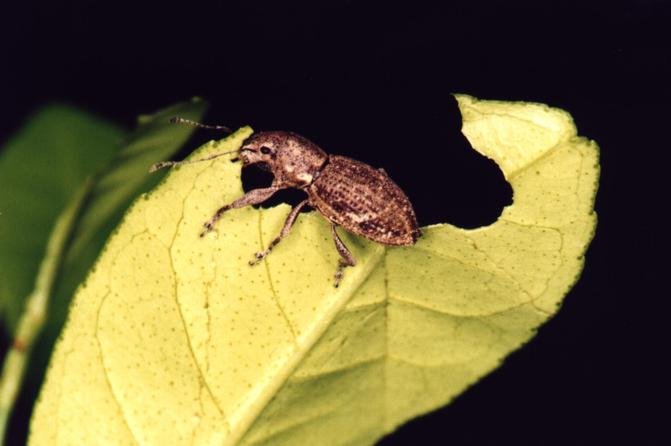
Some species of white fringed beetles, a common invasive weevil, reproduce asexually.
Photo by Analia Lanteri/Facultad de Ciencias Naturales y Museo de La Plata, Argentina
July 30 (UPI) -- Invasive all-female weevils pass along epigenetic changes to their offspring, helping them adapt to new environs, according to a new study.
Across most of the animal kingdom, an organism's ability to adapt and evolve is largely dependent on genetic variation.
Sufficient genetic diversity makes it more likely that favorable traits will emerge and proliferate as the fittest specimens populate subsequent generations.
Some species, however, reproduce asexually, which means their genetic reservoir is limited. So how do they adapt to new environs?
July 30 (UPI) -- Invasive all-female weevils pass along epigenetic changes to their offspring, helping them adapt to new environs, according to a new study.
Across most of the animal kingdom, an organism's ability to adapt and evolve is largely dependent on genetic variation.
Sufficient genetic diversity makes it more likely that favorable traits will emerge and proliferate as the fittest specimens populate subsequent generations.
Some species, however, reproduce asexually, which means their genetic reservoir is limited. So how do they adapt to new environs?
RELATED Competition leaves a permanent genetic imprint on the brains of songbirds
To find out, researchers collected specimens of two asexually reproducing, invasive weevil species, Naupactus cervinus and N. leucoloma, from Florida, California and Argentina.
Despite sharing the exact same DNA, researchers found the weevil populations in each place produced different proteins to help them digest local plants.
Gene expression analysis -- detailed Friday in the journal Plos ONE -- showed some plants elicited a more pronounced epigenetic response than others
.
RELATED New grafting technique yields more productive, resilient plants, crops
"We found that some host plant groups, such as legumes, appear to be more taxing for weevils and elicit a complex gene expression response," study co-author Andrea Sequeira, professor of biological sciences at Wellesley College, said in a press release.
"However, the weevil response to taxing host plants shares many differentially expressed genes with other stressful situations, such as organic cultivation conditions and transition to novel hosts, suggesting that there is an evolutionarily favorable shared gene expression regime for responding to different types of stressful situations," Sequeira said.
Researchers also found weevil mothers, which practice clonal reproduction, are able to "prime" their offspring with these epigenetic changes.
RELATED New grafting technique yields more productive, resilient plants, crops
"We found that some host plant groups, such as legumes, appear to be more taxing for weevils and elicit a complex gene expression response," study co-author Andrea Sequeira, professor of biological sciences at Wellesley College, said in a press release.
"However, the weevil response to taxing host plants shares many differentially expressed genes with other stressful situations, such as organic cultivation conditions and transition to novel hosts, suggesting that there is an evolutionarily favorable shared gene expression regime for responding to different types of stressful situations," Sequeira said.
Researchers also found weevil mothers, which practice clonal reproduction, are able to "prime" their offspring with these epigenetic changes.
RELATED Stickleback study shows epigenetic changes key to climate change adaptation
"Originally, we thought that these changes would only be seen in a single generation," said lead study author Ava Mackay-Smith, a 2020 graduate of Wellesley College.
"When we studied larvae, who do not yet have mouths or eat plants, we found evidence of the same proteins and adaptations from their mothers," Mackay-Smith said.
The findings undermine previous assumptions that epigenetic instructions are lost between generations.
Researchers hope that by studying the mechanics of epigenetic inheritance, researchers can develop better strategies for protecting ecosystems from invasive, asexual species.
"Knowing what is in this insect's repertoire, you could imagine that since we've now identified the proteins that are regulated differently, you could target a specific protein and design a targeted pesticide that removes only that species of weevil, without harming other native insects or fauna," Sequeira said.
No comments:
Post a Comment